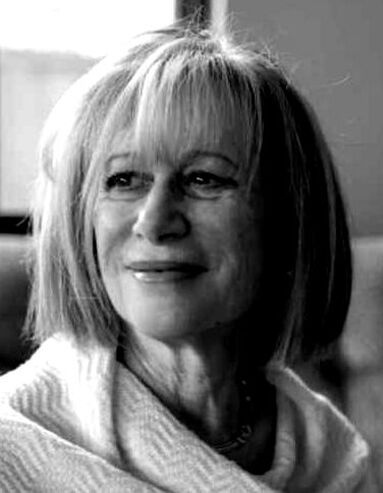
It gives me enormous pleasure to welcome Judy Stanigar onto the website today. Judy is a psychotherapist and author. Having lived in many cities across the US, she considers herself a non-reformed New Yorker.
Alex: Tell me a bit about yourself, Judy.
Judy: I was born and raised in Israel and when I was a teenager, I moved with my family to the U.S. Being an immigrant is never easy, but especially hard for teenagers who just want to fit in with
their peers. I think that I turned to writing then. I started keeping a journal following the “Dear Kitty” Anne Frank model – my diary was my best friend. Although even as a child I lived in my head and loved to read and create stories.
Alex: How would you describe your writing, and are there particular themes that you like to explore?
Judy: I’m not sure I can describe my writing. I know what I’m aiming for, which is telling stories about real people and situations that are relatable. And while I like to tackle serious themes of loneliness, connectedness, love and loss, I aim to do it with a light touch and inject my stories with humorous observations about people’s behavior. I like to think that I get my themes and use of humor from being a therapist for many years.
Alex: Are you a writer that plans a detailed synopsis or do you set out with a vague idea and let the story unfold as you write?
Judy: I’m a writer who wishes she COULD plan a detailed synopsis because I think that may be an easier road, but my mind just refuses to do so. Instead, I set out with an idea, mostly my ideas are about characters, and then I let them “talk” to me and hopefully the story will unfold. For example when I worked at a methadone clinic I felt that I wanted to write about that world and that’s how I came up with the idea for Marika’s Best Laid Plan. However, not having a detailed synopsis meant that the story needed to be unfolded and re-folded a few times.
Alex: Tell me a bit about yourself, Judy.
Judy: I was born and raised in Israel and when I was a teenager, I moved with my family to the U.S. Being an immigrant is never easy, but especially hard for teenagers who just want to fit in with
their peers. I think that I turned to writing then. I started keeping a journal following the “Dear Kitty” Anne Frank model – my diary was my best friend. Although even as a child I lived in my head and loved to read and create stories.
Alex: How would you describe your writing, and are there particular themes that you like to explore?
Judy: I’m not sure I can describe my writing. I know what I’m aiming for, which is telling stories about real people and situations that are relatable. And while I like to tackle serious themes of loneliness, connectedness, love and loss, I aim to do it with a light touch and inject my stories with humorous observations about people’s behavior. I like to think that I get my themes and use of humor from being a therapist for many years.
Alex: Are you a writer that plans a detailed synopsis or do you set out with a vague idea and let the story unfold as you write?
Judy: I’m a writer who wishes she COULD plan a detailed synopsis because I think that may be an easier road, but my mind just refuses to do so. Instead, I set out with an idea, mostly my ideas are about characters, and then I let them “talk” to me and hopefully the story will unfold. For example when I worked at a methadone clinic I felt that I wanted to write about that world and that’s how I came up with the idea for Marika’s Best Laid Plan. However, not having a detailed synopsis meant that the story needed to be unfolded and re-folded a few times.

Alex: Tell us about your latest novel.
Judy: Marika, a lonely and depressed social worker, has been traumatised at a young age by her mother’s suicide. She has decided that it's best to avoid love because love hurts. As a supervisor at a methadone clinic, she’s trying to heal her heroin addicted clients, but can’t seem to mend her own damaged self. Her choices have left her carefully ordered life a lonely, disconnected
one, not unlike her clients’ lives. Everything is about to change for Marika by an encounter with her ex-fiance. Though that relationship was problematic, she hatches a plan to rekindle this failed relationship because after all she’s after security, not love. While Marika embarks on her Cecil Project, she gradually opens her heart to her ‘adopted Gramps’ – her elderly neighbor, and her recovering patient, Rosie as well as the clinic’s unconventional new medical director. Set in the mid 1980’s in New York City, Marika’s Best Laid Plan exposes a world of drug addiction and a parallel world of the worried well. There are lessons for all to learn about the power of connection and love, the things without which life is unbearable.
Alex: What was the first book you read?
Judy: Wow, I’m not so young and so it’s hard to think back to that. But in Israel we had a very popular series about a little anthropomorphic chimp called Kofiko which I adored. And I then moved to the book I consider my first real book which was Pippi Longstocking. I still love that book.
Alex: How much research do you do and what does it usually entail?
Judy: My first two books to date were taken from my own experiences, so I honestly didn’t need to do much research. For example Marika’s Best Laid Plan takes place in NYC in the 1980s and I lived there. The protagonist works in a methadone clinic, which is what I did too. So I lived the life of the characters. However, I did need to do a little research about that era’s music, films, etc. to portray the times with verisimilitude. I needed to remind myself about who was the mayor at the time, what did the city look like back then, which songs topped the charts and so on.
Judy: Marika, a lonely and depressed social worker, has been traumatised at a young age by her mother’s suicide. She has decided that it's best to avoid love because love hurts. As a supervisor at a methadone clinic, she’s trying to heal her heroin addicted clients, but can’t seem to mend her own damaged self. Her choices have left her carefully ordered life a lonely, disconnected
one, not unlike her clients’ lives. Everything is about to change for Marika by an encounter with her ex-fiance. Though that relationship was problematic, she hatches a plan to rekindle this failed relationship because after all she’s after security, not love. While Marika embarks on her Cecil Project, she gradually opens her heart to her ‘adopted Gramps’ – her elderly neighbor, and her recovering patient, Rosie as well as the clinic’s unconventional new medical director. Set in the mid 1980’s in New York City, Marika’s Best Laid Plan exposes a world of drug addiction and a parallel world of the worried well. There are lessons for all to learn about the power of connection and love, the things without which life is unbearable.
Alex: What was the first book you read?
Judy: Wow, I’m not so young and so it’s hard to think back to that. But in Israel we had a very popular series about a little anthropomorphic chimp called Kofiko which I adored. And I then moved to the book I consider my first real book which was Pippi Longstocking. I still love that book.
Alex: How much research do you do and what does it usually entail?
Judy: My first two books to date were taken from my own experiences, so I honestly didn’t need to do much research. For example Marika’s Best Laid Plan takes place in NYC in the 1980s and I lived there. The protagonist works in a methadone clinic, which is what I did too. So I lived the life of the characters. However, I did need to do a little research about that era’s music, films, etc. to portray the times with verisimilitude. I needed to remind myself about who was the mayor at the time, what did the city look like back then, which songs topped the charts and so on.

Alex: Do you ever base your characters on people you have encountered in real life?
Judy: The short answer is yes, a lot. In both my novels I based most of my characters not necessarily on one particular person, but a compilation of two or three people. And I infuse my characters with traits of people I know. For example, Marika’s ex-love interest is based on an old boyfriend or two, and the Jamaican psychiatrist has many of my Jamaican husband’s characteristics. I would say that the protagonist, Marika, is based very much on my personality, although her journey is not mine.
Alex: Which was the last book you read that blew you away?
Judy: A Gentleman in Moscow by Towles. This is going back a few years but left an impression because it was so original. There are actually quite a few other books, but this one just sticks in my mind because the whole novel takes place in such a confined space yet it’s still riveting. Which also makes me think of Room.
Alex: How do you market your books?
Judy: Let’s see, my first book I self-published on Amazon and didn’t market it at all. It was read by my friends and family and that was that. This time around I’ve tried to get on board with social media and market the book there. I’m also reaching out to local outlets, such as libraries, and book stores. And I hired a publicist.
Alex: What are your interests aside from writing? And what do you do to unwind?
Judy: First and foremost, I love to travel. Unfortunately, that’s been curtailed by Covid. But I’m glad that we’ve travelled probably to most continents, though not Antarctica yet. Otherwise I love to watercolor, which I also picked up just a few years ago. And of course living now in Southern California where the weather is usually good and the beaches are great, I do lots of beach hikes, as opposed to walking up Fifth Ave. And I love movies, and to read.
Alex: Which authors do you particularly admire and why?
Judy: The first author that comes to mind is Barbara Pym, a somewhat obscure British author. It’s not just that I love her writing, her delicious observations, sense of humor and irony, but the fact that after having had some success she was dropped by her publisher, and despite not being able to find another one for many years, she never stopped writing. That’s so admirable. And I’m thrilled that she was “rediscovered” later in life and published a few more books. Another author I admire is Delia Owens who published her first book, Where the Crawdads Sing quite late in life. I’ve often struggled with that, thinking that I’m kind of late to this party, why bother, but it’s authors like Owens that propel me to go on.
Alex: Thank you so much for sharing your writing journey with us, Judy. It's been both fascinating and insightful. You are not the first to give Delia Owens a plug. I've yet to read Where the Crawdads Sing, but it's on my list. Thank you again and good luck with your latest book.
Judy: Thank you Alex. It's been lovely to chat.
Judy: The short answer is yes, a lot. In both my novels I based most of my characters not necessarily on one particular person, but a compilation of two or three people. And I infuse my characters with traits of people I know. For example, Marika’s ex-love interest is based on an old boyfriend or two, and the Jamaican psychiatrist has many of my Jamaican husband’s characteristics. I would say that the protagonist, Marika, is based very much on my personality, although her journey is not mine.
Alex: Which was the last book you read that blew you away?
Judy: A Gentleman in Moscow by Towles. This is going back a few years but left an impression because it was so original. There are actually quite a few other books, but this one just sticks in my mind because the whole novel takes place in such a confined space yet it’s still riveting. Which also makes me think of Room.
Alex: How do you market your books?
Judy: Let’s see, my first book I self-published on Amazon and didn’t market it at all. It was read by my friends and family and that was that. This time around I’ve tried to get on board with social media and market the book there. I’m also reaching out to local outlets, such as libraries, and book stores. And I hired a publicist.
Alex: What are your interests aside from writing? And what do you do to unwind?
Judy: First and foremost, I love to travel. Unfortunately, that’s been curtailed by Covid. But I’m glad that we’ve travelled probably to most continents, though not Antarctica yet. Otherwise I love to watercolor, which I also picked up just a few years ago. And of course living now in Southern California where the weather is usually good and the beaches are great, I do lots of beach hikes, as opposed to walking up Fifth Ave. And I love movies, and to read.
Alex: Which authors do you particularly admire and why?
Judy: The first author that comes to mind is Barbara Pym, a somewhat obscure British author. It’s not just that I love her writing, her delicious observations, sense of humor and irony, but the fact that after having had some success she was dropped by her publisher, and despite not being able to find another one for many years, she never stopped writing. That’s so admirable. And I’m thrilled that she was “rediscovered” later in life and published a few more books. Another author I admire is Delia Owens who published her first book, Where the Crawdads Sing quite late in life. I’ve often struggled with that, thinking that I’m kind of late to this party, why bother, but it’s authors like Owens that propel me to go on.
Alex: Thank you so much for sharing your writing journey with us, Judy. It's been both fascinating and insightful. You are not the first to give Delia Owens a plug. I've yet to read Where the Crawdads Sing, but it's on my list. Thank you again and good luck with your latest book.
Judy: Thank you Alex. It's been lovely to chat.
